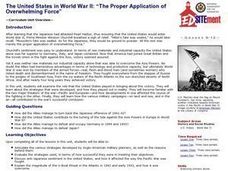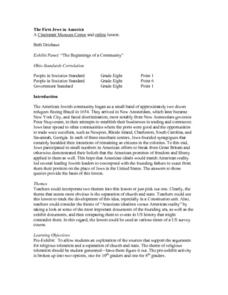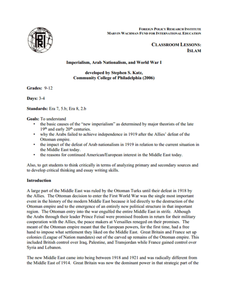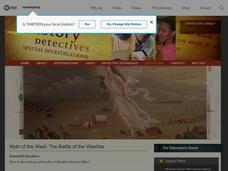Alabama Department of Archives and History
Extra! Extra! Read All About It?
Remember the Lusitania! As part of their study of the causes of World War I, class members examine newspaper articles and propaganda posters about the sinking of the Lusitania and then craft their own news story about the event.
National Endowment for the Humanities
Lesson 2: The United States, France, and the Problem of Neutrality, 1796–1801
While the French Revolution could be considered inspired by the American Revolution, it created thorny problems for the new United States. Should the United States get involved and be drawn into a European drama? Was the US strong...
National Endowment for the Humanities
How "Grand" and "Allied" Was the Grand Alliance?
Learn more about the Grand Alliance with a scaffolded lesson plan that includes four activities. Class members use primary sources to complete a map exercise, understand the goals and objectives of each individual nation, and participate...
Curated OER
What Experiences Shaped the Founders' Thinking about Government?
Students study the ideas and experiences that shaped the founding fathers' perspective about government. In this the government lesson plan, students examine the Articles of Confederation as they relate to the power of government....
Roy Rosenzweig Center for History and New Media
Slaves and Indentured Servants
In theory, at least, indentured servitude and slavery were two different practices in the American colonies. Class groups conduct a close reading of two primary source documents, one written by a slave and one by an indentured servant,...
National Endowment for the Humanities
Ending the War, 1783
The various peace proposals, made by both sides, to end the Revolutionary War come under scrutiny in this final lesson of a three-part series on the war. Class members read primary source documents and compare them with military...
Curated OER
The War in the North, 1775-1778
Students investigate the hardships and difficulties that the Continental army faced in the early years of the American War for independence. the battles of Lexington and concord and the expectations of the Continental Army forms the...
Curated OER
The American War for Independence
Students complete a unit of lessons that examine the goals of the Americans during the Revolutionary War. They explore an online interactive map of major campaigns, read and analyze primary source documents, and analyze diplomatic and...
National Endowment for the Humanities
The War in the North, 1775–1778
Using primary source documents, including maps, learners examine Revolutionary War events from 1775 to 1778. The focus here is on the challenges George Washington and the Continental army faced and how they persevered in spite of those...
Roy Rosenzweig Center for History and New Media
Patriots or Traitors - Point of View in the War for Independence
Patriots or traitors? Class members analyze images that present widely differing views of the Boston Tea Party, identifying the point of view of the image, the propaganda devices used, and the intended audience.
National Endowment for the Humanities
The Monroe Doctrine: A Close Reading
Students identify specific passages in the Monroe Doctrine to events in early U.S. diplomacy.
Curated OER
"The Proper Application of Overwhelming Force": The United States in World War II
Students examine the role that the U.S. played in bringing about victory in the two major theaters of the war in the Pacific and Europe. How the various military campaigns contributed to the war's successful conclusion forms the focus of...
Curated OER
Turning the Tide in Europe, 1942-1944
High schoolers explore the overall strategies pursued by the Americans and their British allies in the initial months of World War II in Europe. By examining military documents, students examine the decision to invade North Africa...
Curated OER
The First Jews in America
Learners investigate how Jews established roots in America. Students determine the difference between religious tolerance and separation of church and state. Learners participate in a role-play activity using primary and secondary...
Curated OER
"Declaration of Independence" From Plagiarism
So, what does the Declaration of Independence even mean? Learners of all ages paraphrase the Declaration of Independence in modern terms. They work as a group or class to paraphrase the language of the Declaration of Independence. There...
Foreign Policy Research Institute
Imperialism, Arab Nationalism and World War I
Continued conflict in the Middle East makes this activity relevant, and the inclusion of a critique of Lawrence of Arabia might increase student interest in a potentially challenging topic. The resource includes a solid introduction to...
Friends of Fort McHenry
Was the War of 1812 Our Second War of Independence?
Though it occurred almost 40 years later, could the United States have been fighting for their independence again in the War of 1812? Using appropriate primary source material from each of the two wars, compare and contrast the situation...
What So Proudly We Hail
Life, Liberty, and the Pursuit of Happiness: A Lesson on the Declaration of Independence
What does it mean to say that a right is unalienable? How did the founding fathers convey this revolutionary concept in the Declaration of Independence? Engage in a close reading and analysis of the Declaration of Independence, and...
Curated OER
The Design of Fort McHenry: The Star Fort
What makes an effective fort, and why might a city feel that they need such a structure? Your young historians will explore the purpose and design for Fort McHenry, and build their own models of a fort based on the information they have...
National Constitution Center
Fourth of July (Grades 9-12)
Class members work to translate the Declaration of Independence into their own words, as well as design a Facebook page within the context of 1776 to raise public awareness about the document and its meaning for citizens.
PBS
Myth of the West: The Battle of the Washita
Go West, young man! Scholars use PBS video clips, slide shows, and interactive materials to create a picture of Manifest Destiny in the American West. Using a variety of primary and secondary sources, young historians learn about the...
North Carolina Consortium for Middle East Studies
Missing Pieces of the Puzzle: African Americans in Revolutionary Times
What's missing from most studies of the American Revolutionary War is information about the role African Americans played in the conflict. To correct this oversight, middle schoolers research groups like the Black Loyalists and Black...
Roy Rosenzweig Center for History and New Media
Founding Documents
Teach the class about the predecessor to Declaration of Independence—the Virginia Declaration of Rights. Using the foundational documents, scholars examine the two writings to consider how they are similar and how they are different. A...
Curated OER
The American Revolution: A Play
No lesson accompanies this drama about the American Revolution. With 13 speaking roles, the short script could be used for a class production, a lesson on the parts of a play, or to supplement your social studies curriculum.
Other popular searches
- Christmas in Great Britain
- About Great Britain
- Country Report Great Britain
- Great Britain Geography
- Great Britain Maps
- Geography of Great Britain
- Great Britain Government
- Maps of Great Britain
- Folk Music Great Britain
- Great Britain Kazakhstan
- Great Britain Lesson Plans
- Patron Saint of Great Britain

























